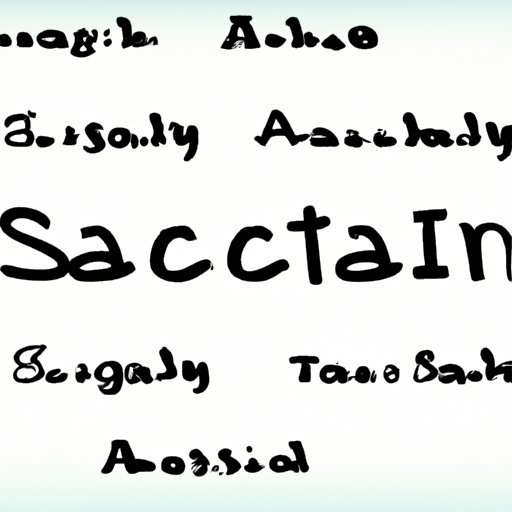Introduction
Informal language is a type of language that is used in everyday conversations and is considered to be more casual than formal language. It often includes slang words, colloquialisms, and other non-standard terms. This article will explore the basics of informal language in writing, including its purpose, types of informal language, examples, tips for incorporating slang and colloquialisms, rules for using slang, strategies for writing with an informal tone, techniques for using humor and sarcasm, and ideas for incorporating casual language in a professional context.
Exploring Informal Language in Writing: A Guide to Understanding the Basics
Informal language is a type of language that is used in everyday conversations and is considered to be more casual than formal language. It often includes slang words, colloquialisms, and other non-standard terms. In order to effectively use informal language in writing, it is important to understand its purpose, types, and examples.
Types of Informal Language
The most common types of informal language are slang, colloquialisms, and idioms. Slang is a type of informal language that is characterized by non-standard words or phrases that are typically used by a particular group of people. Colloquialisms are expressions that are commonly used in everyday speech but not in formal writing. Idioms are expressions that have a figurative meaning that is different from the literal meaning. Examples of informal language include “dude,” “catch you later,” “chill out,” and “take a chill pill.”
Examples of Informal Language
Informal language can be used in a variety of ways, depending on the context. For example, it can be used to add humor or emphasis to a sentence, or to make a statement sound more casual. Here are some examples of informal language in action:
- “That’s so cool!”
- “That’s the bomb!”
- “That’s the bee’s knees!”
- “You rock!”
- “Catch you later!”

How to Incorporate Casual Language into Your Writing
Incorporating informal language into your writing can be tricky, but there are some tips and strategies that can help you do it successfully. Here are a few tips for using slang and colloquialisms in your writing:
- Be aware of the audience you are writing for. Not all readers may understand the slang or colloquialisms you are using, so it is important to consider who your audience is and adjust your language accordingly.
- Be mindful of the context. Some slang and colloquialisms may be appropriate in one context but not in another. Consider the situation you are writing about and choose your language accordingly.
- Choose your words carefully. Slang and colloquialisms can be powerful tools for conveying emotion and creating a certain tone, but they should be used judiciously.

Using Slang and Colloquialisms Appropriately in Writing
When using slang and colloquialisms in your writing, it is important to follow certain rules in order to ensure that you are using them appropriately. Here are some guidelines for avoiding inappropriate language:
- Avoid offensive language. Some slang words may be seen as offensive or inappropriate, so it is important to be mindful of the words you are using.
- Don’t overuse slang and colloquialisms. Too much informal language can make your writing less effective, so it is important to use it sparingly.
- Be aware of regional differences. Slang and colloquialisms may be understood differently in different parts of the world, so it is important to consider your audience when using them.

Tips for Writing with an Informal Tone
Writing with an informal tone can be challenging, but there are some techniques that can help you do it successfully. Here are some ideas for incorporating casual language in a professional context:
- Use humor and sarcasm. Humor and sarcasm can be effective tools for conveying emotion and creating an informal tone. Just be sure to use them sparingly and appropriately.
- Include anecdotes and stories. Including stories and anecdotes in your writing can help to create a more conversational, informal tone.
- Write in the first person. Writing in the first person can help to create a more personal and informal tone.
An Introduction to Informal Language in Writing: What You Need to Know
Informal language in writing can be a powerful tool for conveying emotion and creating a certain tone. However, it is important to use it appropriately and judiciously. Here are some benefits of using informal language in writing, as well as some common mistakes to avoid:
- Benefits of using informal language: Using informal language in writing can help to create a more conversational, personal, and engaging tone. It can also help to make your writing more relatable and accessible to readers.
- Common mistakes to avoid: Overusing slang and colloquialisms can make your writing less effective, so it is important to use them sparingly. Additionally, it is important to be aware of cultural differences and avoid using language that may be seen as offensive or inappropriate.
Conclusion
Informal language is a type of language that is used in everyday conversations and is considered to be more casual than formal language. It often includes slang words, colloquialisms, and other non-standard terms. In order to effectively use informal language in writing, it is important to understand its purpose, types, and examples. Additionally, it is important to be aware of the audience you are writing for, the context of the situation, and the rules for using slang and colloquialisms appropriately. With these tips and strategies, you can confidently incorporate informal language into your writing.
(Note: Is this article not meeting your expectations? Do you have knowledge or insights to share? Unlock new opportunities and expand your reach by joining our authors team. Click Registration to join us and share your expertise with our readers.)
